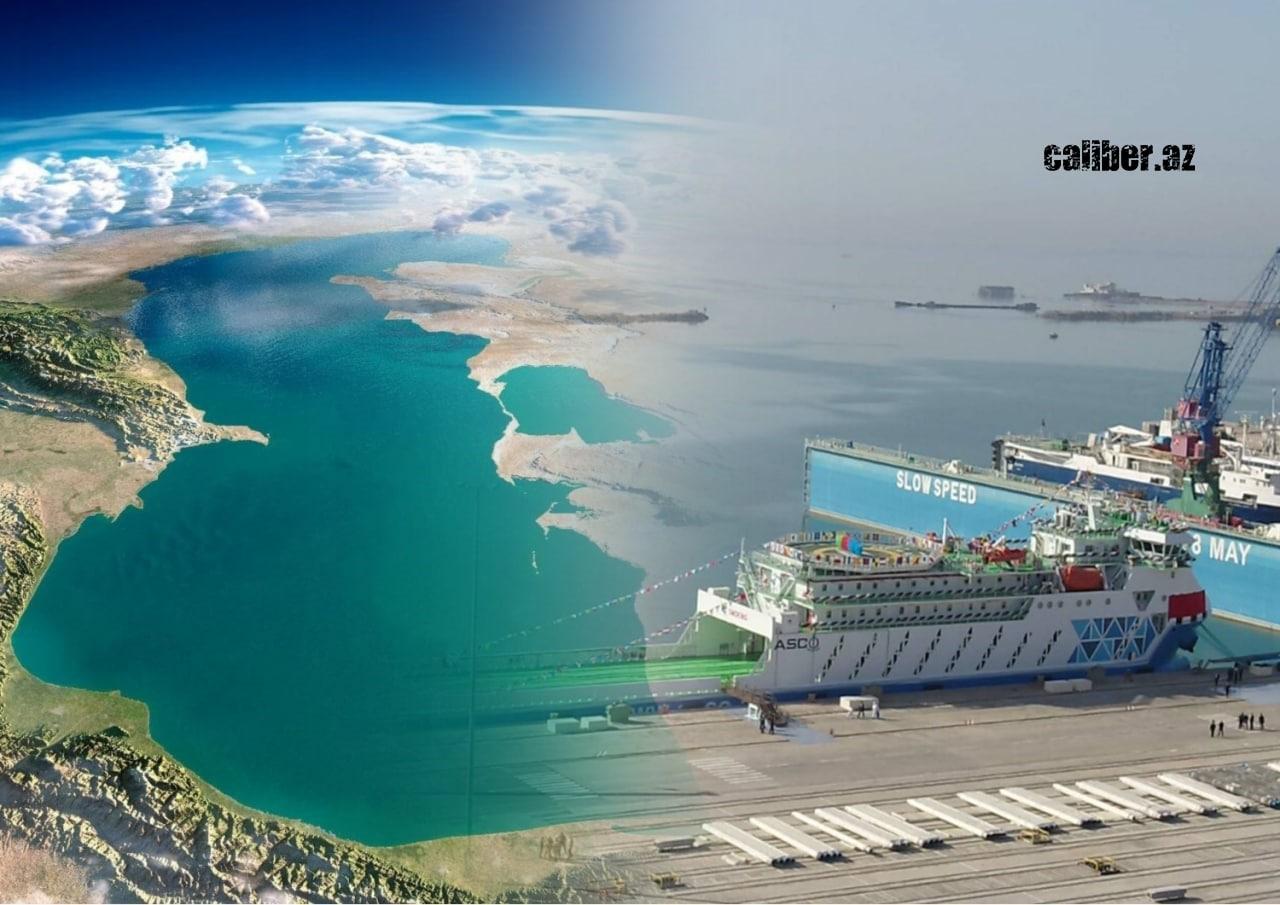Azerbaijan expands transport and logistics infrastructure Caspian trade bridges
Over the past decade, Azerbaijan and its partners across the Caspian region have launched ambitious initiatives to enhance the transport and logistics network of the Middle Corridor. Central to this effort is the modernisation of port hubs and the expansion of ferry, tanker, and dry cargo fleets—a sector where Azerbaijan is emerging as a regional leader.
With the largest and most capable cargo fleet in the Caspian, the Caspian Shipping Company (ASCO) recorded a 9.3% increase in maritime cargo handling between January and August 2025. To further boost cargo transportation across the Caspian, ASCO is also expanding its fleet with new orders at the Baku Shipyard. Significantly, construction of the third next-generation Ro-Pax ferry at the shipyard is approaching completion, marking another milestone in Azerbaijan’s regional shipping ambitions.
With active support from the Caspian states, the combined maritime corridor — the Trans-Caspian International Transport Route (TITR) — has been operating very successfully for seven years. Over the past four years, delivery times along this route have decreased from 58–60 days to just 15 days, while cargo volumes have increased more than sevenfold — from 600,000 tonnes in 2021 to 4.5 million tonnes in 2024. According to World Bank forecasts, cargo handling on the TITR could reach 10–11 million tonnes by 2030.
However, to further increase cargo volumes along the TITR, the project participants — primarily Azerbaijan, Kazakhstan, and Georgia — need to simplify cross-border and customs procedures, digitise transport logistics, expand multimodal container transportation, and, most importantly, invest hundreds of millions of dollars in port infrastructure and vessel acquisition. This is crucial, as high congestion and “bottleneck” effects are frequently observed in the port of Aktau as well as in Georgian seaports, hindering rapid growth in cargo handling.
To address these challenges, nearly three years ago Baku and Astana signed a Roadmap for the synchronised elimination of bottlenecks and the development of the TITR for 2022–2027. This includes dredging work at Kazakhstan’s Kuryk port, expanding the capacity of the modernised Aktau port, and, more recently, the modernisation and expansion of the container terminal at the port of Poti.

Considering the plans for the development of the Middle Corridor by 2030, the expansion of ferry and dry cargo fleets of various types has become a common trend among the region’s countries. Alongside Kazakhstan and Turkmenistan, Uzbekistan — despite having no direct access to the Caspian Sea — is also moving in this direction.
“Given the increase in cargo traffic across the Caspian Sea, ferry waiting times have extended by 30–40 days, resulting in delayed shipments. In this regard, Uzbek entrepreneurs, together with Turkish companies, have decided to operate ferries on the Caspian Sea,” recently stated Transport Minister Ilhom Mahkamov.
In August 2023, the presidents of Uzbekistan and Azerbaijan discussed the possibility of establishing a joint logistics company within the framework of the Trans-Caspian Corridor, as well as constructing warehouses and logistics centres at the Alat port and in the ports of third countries. In July of this year, the two Turkic states signed a protocol on cooperation in shipping and shipbuilding. Baku and Tashkent plan to establish joint ferry production, with media reports estimating the project’s financing at around $150 million.
Azerbaijan is also investing heavily in the development of the Baku International Sea Trade Port (BISTP), increasing its cargo handling capacity from 15 to 25 million tonnes. Work is underway to expand the container terminal, as well as to build and modernise areas for handling and storing dry cargo, fertilisers, grain, and other goods. Currently, the container terminal at BISTP has a capacity of 150,000 TEU (twenty-foot equivalent units), which is planned to increase to 260,000 TEU within the next two years.
At the same time, the country is steadily developing its cargo fleet — a crucial transport component ensuring the smooth operation of the Trans-Caspian crossing. ASCO's fleet is the largest on the Caspian Sea, consisting of 55 vessels of various types, including around 20 tankers of different tonnages.
In recent years, given the dynamic growth in demand for transport services along the TITR corridor, ASCO has been increasing its cargo handling volumes. According to official statistics, the volume of cargo transported by sea from January to August 2025 reached 6.17 million tonnes, 9.3% higher than the same period last year. Of this total, 48.2% consisted of liquid oil cargo, with a noticeable increase also recorded in general dry cargo transportation. Meanwhile, of all the loading and unloading operations carried out at the country’s seaports, 80% involved transit cargo.
In recent years, ASCO, part of the Azerbaijan Transport and Communication Holding (AZCON Holding), has been implementing its strategic shipping development plan for 2022–2030, which envisages the acquisition of around 50 vessels, including both cargo and passenger ships. Notably, most of the cargo vessels will be built domestically: ASCO is gradually placing orders at the Baku Shipyard, and having its own shipbuilding facility — established in 2013 — has allowed Azerbaijan to achieve import substitution while significantly reducing production costs. The shipyard has also carried out several regional projects, repairing vessels from Kazakhstan and Turkmenistan, and in the future Azerbaijan could expect new shipbuilding orders from Central Asian countries, Iran, and Russia.
For now, the main focus of the Baku Shipyard is fulfilling ASCO’s orders: over eleven years, the shipyard has built 11 vessels of various types, including one transport ship (SOCAR-1), three supply-passenger vessels (“Ufug,” “Zafar,” and “Turan”), four tankers, two Ro-Pax ferries (“Azerbaijan” and “Zarifa Aliyeva”), as well as a specialised vessel, “Khankendi.”

Notably, the construction of the highly demanded Ro-Pax ferries — capable of transporting both railcars and wheeled vehicles — at the Baku Shipyard continues successfully within the TITR system. The construction of a next-generation Ro-Pax ferry, commissioned by ASCO (part of AZCON Holding), is progressing according to schedule.
As reported to Caliber.Az by Mehman Mehdiyev, head of the press service at Azerbaijan Caspian Shipping Closed Joint-Stock Company (ASCO), 70% of the overall project work has been completed. Hull and engineering systems are 99% finished, while electrical, mechanical, insulation, and onboard accommodation works are ongoing. Compared to previous vessels of the same type, this ferry incorporates a number of design and functional innovations: a three-ton crane has been installed, additional compressed air tanks added, a separate power supply system for refrigerated containers created, infrastructure for detecting hazardous gases in the cargo hold implemented, and the foam fire-extinguishing system upgraded.
The vessel’s design also includes additional guides, two sliding doors, one metal door, an extra hatch, an automatic railway track access system, and a new braking system on the cargo deck.
Overall, the modernised Ro-Pax project is being implemented based on principles of energy efficiency and minimal environmental impact. The third Ro-Pax ferry, expected to enter service in the first quarter of 2026, will make a significant contribution to ensuring the uninterrupted and sustainable growth of cargo transportation along the Middle Corridor once it joins ASCO’s fleet.








